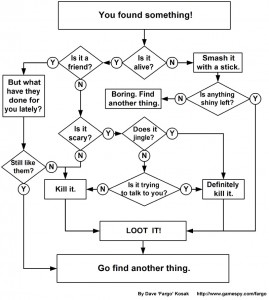 Last time, I outlined a few ways that I’ve seen people go about creating characters. So this time, I’ll go over how I do it.
Last time, I outlined a few ways that I’ve seen people go about creating characters. So this time, I’ll go over how I do it.
Sadly (or perhaps it’s a good thing), there’s no one formula I use. Sometimes I will think, “Wow, that’s a neat power/ability! I think I’ll design a character around that.” Sometimes I’ll be intrigued by a character in a movie or book, see a synergy in them with another character from some different series (or half-formed concept already lurking in my brain), and combine the two (or more) into something new. Sometimes I hear a particularly awesome song and it just gives me a concept. That last was how I made my character Sammael; here’s the song (not sure if this will work in Facebook, so if not, the file is here):
[display_podcast]
The child-like-yet-creepy tune gave me the image of a kid in a cathedral with dead bodies all around him. I let the scene play out in my head, and created a character from the result. What caused the scene? What happened before? What would it do to a child, and what would they end up like after? Just a small jump from one step to the next, and by the time it’s done, you have a character.
But more often than not, inspiration strikes randomly. I’m not sure what path those neural impulses take, but one minute I’ll be all, “Mmmm, steak,” and the next it’s, “Wouldn’t it be neat if there were a modern-day cop who worshiped Aztec gods and made human sacrifices out of really evil people that got let go due to legal loopholes?”
So if I had to nail down a formula, here would be the steps (though sometimes the order shifts drastically):
- Figure out the character concept — the core of who the character is, what they do, and why. This part is actually pretty easy for me.
- Flesh out the personality. Give the character some quirks. If the character concept follows a stereotype, find some ways to break the mold.
- Write a background story. This part is also pretty easy, but requires a bit more discipline.
- Fill out the character sheet. Also easy, once the above are complete.
- Come up with a name for the character. Hardest part, almost without fail.
I’ve found that once I’ve done 1-3, the character sheet comes almost without thought. By that point, I know the character. I know what they’re good at, what they like, what they would have practiced and studied. So filling out the skills, powers, and the rest of the character sheet is easy.
Step 5, ironically, probably takes me longer than any of the other steps. I don’t like just giving a character any name; I like to give them a name that “feels” right for them, that evokes the right emotions, and that often takes a while.
Overall, I find that I enjoy characters as much as playing them, on average. Sometimes I have more fun making the character than playing it, or vice-versa, but in the end it’s about even. If there’s one thing I like about being the storyteller/gamemaster/what-have-you, it’s that I get to create and play a bunch of different characters.
